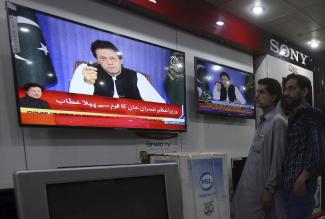Change of government
Flamboyant icon of the past

Pakistanis long for peace and prosperity, and they are fed up with the archaic establishment unresponsive to people's aspirations. In three different elections, they voted three different parties to power. Military rule ended in 2008 when Pervez Musharraf resigned as president. Shortly before the election back then, Benazir Bhutto was killed, and her Pakistan People’s Party (PPP) won. Five years later, the voters kicked the PPP out, and Nawaz Sharif of the PMLN (Pakistan Muslim League – Nawaz) became prime minister.
Now many people hope that Imran Khan will deliver the peaceful and productive future that neither the PPP nor the PMLN managed to bring about. The PPP is dominated by the Bhutto clan, and the PMLN by the Sharif family. Both are embroiled in multiple cases of corruption. Whether the PTI will prove to be different remains to be seen.
Khan is a former cricket star. Led by him, Pakistan’s team won the world cup in 1992. He became politicised after retirement and raised his profile through philanthropy. He used to have an image of a playboy earlier but has projected himself as a God fearing Muslim in politics. A senior analyst calls him a “flamboyant icon of the past” who turned into an “engaging politician”.
Khan’s first TV address to the nation focused on austerity and accountability. He pledged to reside in a small three-bedroom house and turn the palatial PM House in Islamabad into a university. He said he needs only two house servants, whereas 500 are engaged for the upkeep of the luxurious PM House.
In 70 minutes, he touched many issues of public concern. He spoke of employment, education, agriculture, water, health care and the environment. He mentioned inflation as well as the budget and current account deficits, but he shied away from the most controversial economic policy issue. He did not make a commitment on whether he will or will not turn to the International Monetary Fund (IMF) for a bail out. Pakistan’s exchange rate has recently fallen fast, and the foreign-exchange reserves are dwindling. A crisis is brewing. During the campaign, Khan promised to create an “Islamic welfare state”, but the country lacks the revenue for major investments in social services.
He mentioned the China-Pakistan Economic Corridor (CPEC), in the context of which Beijing has granted Pakistan huge loans. Unlike the previous prime ministers, however, he does not seem to be too excited over China’s engagement, but he did not comment on how he will handle the CPEC induced debt burden.
Khan announced he will make the government lean and clean. Whistleblowers in the public service – especially in revenue collection – are not only to get legal protection. Khan said he will design an incentive package to motivate them.
Another important topic Khan did not mention was the Islamist militancy that has claimed thousands of lives in the past two decades. His approach to foreign affairs remains unclear too. He did not go beyond the platitude of desiring friendly relations with all neighbours.
After previous governments disappointed the nation, people hope Khan will prove better. There are doubts however. One observer says that the world is getting increasingly unpredictable and scarier. In his eyes, the misdirecting of populist sentiments gave rise to Narendra Modi in India and Donald Trump in the USA. He sees Khan as the third corner of a “trouble triangle”. This observer voted for the PMLN because the Sharifs took on the military establishment. In contrast, Khan’s campaign found support in military circles.
A business leader says that he will wait for three months “before committing unfiltered support to Khan”. The decision will depend on what the new prime minister does to weed out corruption and make business easier. According to an expert from the Pakistan Business Council, a private think tank, the crucial issue is how the PTI government will handle the balance-of-payment problems. He says the economy can grow at a sustained rate of seven percent annually if that goes well. Unfortunately, that is quite a big “if”.
Afshan Subohi is a Pakistani business journalist.
asubohi@hotmail.com







